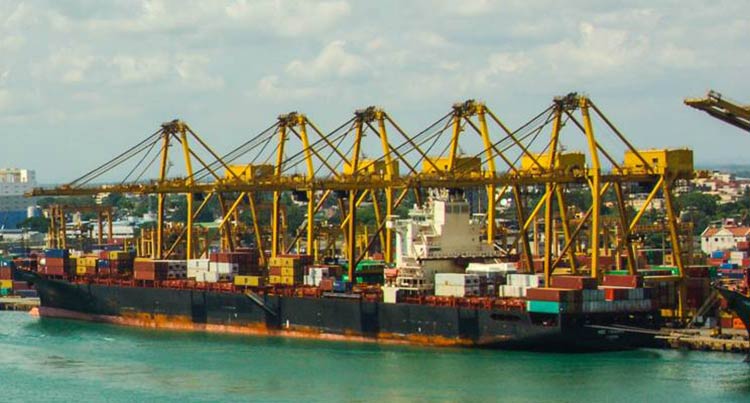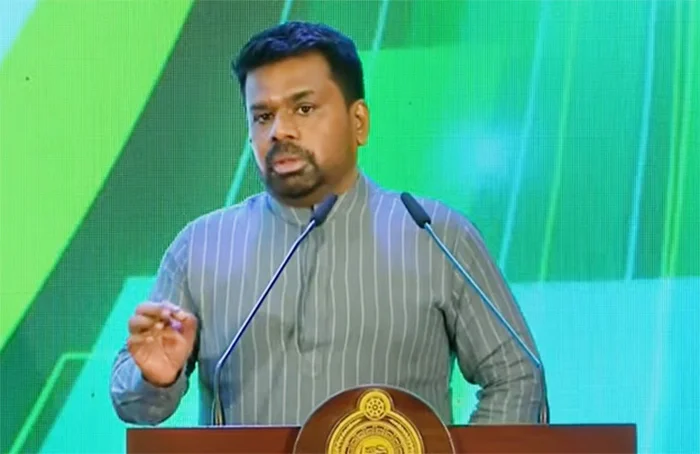News
Colombo Port crisis: 29 Chambers and associations propose plan to tackle congestion

In response to the escalating congestion crisis at the Colombo Port, a coalition of 29 leading chambers of commerce, trade, maritime and logistics associations has proposed a comprehensive action plan to mitigate the economic impact and restore operational efficiency.
The Ceylon Chamber of Commerce in a statement issued to the media on Thursday said that there was an urgent need for immediate and medium-term measures to address delays, rising costs, and the potential loss of Colombo’s status as a regional transshipment hub.
“Exporters are facing potential delays with imported inputs, missed shipping opportunities, and increased processing costs, undermining their competitiveness in the global markets and foreign buyer confidence in Sri Lanka. Reports indicate that ships are bypassing Colombo for more efficient neighbouring ports which would be a permanent shift, resulting in lost container volumes for the Colombo port and rising freight rates, along with additional costs for freight forwarders and shipping lines. Importers, transporters and all other stakeholders are also losing business opportunities due to these delays, contributing to higher prices for essential goods and an increased cost of living for the people of Sri Lanka. The manufacturing sector is struggling with material delays and finally this overall situation threatens Colombo’s status as a transshipment hub and poses serious risks to the overall economy,” it said.
To address these challenges, the joint chambers and associations have outlined a series of short-term and medium-term recommendations. The short-term proposals, to be implemented within the next two weeks, include:
24/7 Scanning and Screening Systems:
Establishing round-the-clock operations for screening units to expedite container processing and integrating other border agencies to streamline approvals.
Expansion of the Green Channel:
Leveraging existing importer data to identify low-risk cargo and expand exemptions to reduce delays.
Fast-Track AEO/CEO Approvals:
Accelerating the approval process for Authorized Economic Operators and Customs Economic Operators to minimize inspections for low-risk cargo.
Risk Management Process Improvements:
Correcting duplications in HS codes and streamlining approvals from border agencies to avoid redundant inspections.
Reconvening the Speedy Clearance Committee:
Establishing a public-private committee to fast-track clearance processes.
Expanding Customs Examination Facilities:
Increasing staff and extending operational hours to expedite container releases.
For medium-term solutions, to be implemented within three to six months, the coalition recommends:
Expanding Container Yard Capacity:
Utilizing underutilized yards near the port to alleviate space constraints.
Digitizing Operations:
Prioritizing the digitalization of Customs processes and risk management systems to enhance transparency and efficiency.
Strengthening Manpower:
Rehiring experienced retired customs officials to address staffing shortages.
Enhancing Accountability:
Introducing a structured framework to monitor implementation and hold relevant parties accountable for delays.
Onboarding Additional AEO/CEO Companies:
Expanding the program to include 50 more companies to facilitate faster clearance.
These recommendations have been proposed by the following Chambers and Associations: The Ceylon Chamber of Commerce (CCC), the American Chamber of Commerce in Sri Lanka (AMCHAM), the Association of Clearing & Forwarding Agents (ACFA), the Association of Container Transporters’ (ACT), and the Association of Inland Container Depot Operators (ACDO). Also contributing are the Association of NVOCC Agents (SLANA), the Ceylon Association of Shipping Agents (CASA), the Ceylon Freight and Logistics Association (CEYFFA), the Ceylon National Chamber of Industries (CNCI), and the CHA Traders Association. Additionally, the Chamber of Construction Industry of Sri Lanka (CCI), the Chamber of Young Lankan Entrepreneurs (COYLE), the Container Transport Owners’ Association (CTOA), and the Customs House Agents and Wharf Assistants Association (CHAWAA) are part of this initiative. The coalition further includes the Essential Food Commodities Importers & Traders Association (EFCITA), the Exporters Association of Sri Lanka (EASL), the Federation of Chambers of Commerce and Industry of Sri Lanka (FCCISL), and the Imports Section of the Ceylon Chamber of Commerce. Other key participants are the International Chamber of Commerce Sri Lanka (ICCSL), the Joint Apparel Association Forum Sri Lanka (JAAF), the National Chamber of Exporters (NCE), and the Sri Lanka Apparel Exporters’ Association (SLEA). Rounding out the group are the Sri Lanka Logistics & Freight Forwarders’ Association (SLFFA), the Sri Lanka Logistics Providers’ Association (SLPA), the Sri Lanka Shippers’ Council, the Sugar Importers Association, the European Chamber of Commerce of Sri Lanka (ECCSL), the National Chamber of Commerce of Sri Lanka (NCCSL), and the Women’s Chamber of Industry and Commerce (WCIC), the CCC release said.
News
Govt. bows to pressure, shelves Grade 6 reforms

The government, under heavy Opposition fire over inclusion of a sex website in the Grade 6 English module, as well as overall education reforms, has decided to put on hold reforms in respect of Grade 6.
Cabinet Spokesman and Media and Health Minister Dr. Nalinda Jayatissa announced the government decision yesterday (13) at the post-Cabinet media briefing at the Information Department.
According to him, the decision had been taken at the previous day’s Cabinet meeting, chaired by President Anura Kumara Dissanayake. Dr. Jayatissa said that education reforms pertaining to Garde 6 had been put on hold until 2027.
The Minister said that other proposed education reforms would be implemented as planned. The Minister said that action would be taken against those responsible for the inclusion of a link to a sex website following investigations conducted by the Criminal Investigation Department and the National Education Institute.
The SJB and several other political parties, as well as civil society groups, have accused the government of promoting an LGBTQ agenda, through the proposed education reforms.
The Opposition grouping Mahajana Handa, on Monday, made representations to the Mahanayake Thera of the Malwatta Chapter regarding the controversial reforms, while urging their intervention to halt the project.
News
AKD: Govt. agenda on track despite Ditwah disaster

President Anura Kumara Dissanayake yesterday (13) vowed to go ahead with his government’s agenda, regardless of the destruction caused by Cyclone Ditwah.
Emphasising the responsibility on the part of all to contribute to the post-Ditwah recovery efforts, President Dissanayake said that he would have complete faith in the public service.
The President said so at the launch of the re-building Sri Lanka project at the BMICH yesterday.
The JVP and NPP leader said that he wouldn’t take advantage of the death and destruction caused by the cyclone or use the situation as an excuse to reverse their agenda or weaken it.
President Dissanayake said that in spite of many calling for amending the then Budget, in view of the cyclone, the government presented the proposals that were agreed before the disaster struck.
News
SL to receive 10 helicopters from US

The United States has announced that it will provide the Sri Lanka Air Force with 10 US Navy TH-57 helicopters free of charge.
The announcement was made by outgoing US Ambassador Julie Chung, who stated, on social media, that the helicopters would be transferred under the United States’ Excess Defence Articles programme. The aircraft are Bell 206 Sea Ranger helicopters previously operated by the US Navy.
US sources said that the transfer was intended to strengthen Sri Lanka’s disaster response capabilities, following the devastating cyclone that struck the island at the end of 2025 and killed more than 600 people. US officials have framed the move as a humanitarian measure aimed at improving aerial rescue and relief operations.
-

 Business3 days ago
Business3 days agoDialog and UnionPay International Join Forces to Elevate Sri Lanka’s Digital Payment Landscape
-

 News3 days ago
News3 days agoSajith: Ashoka Chakra replaces Dharmachakra in Buddhism textbook
-

 Features3 days ago
Features3 days agoThe Paradox of Trump Power: Contested Authoritarian at Home, Uncontested Bully Abroad
-

 Features3 days ago
Features3 days agoSubject:Whatever happened to (my) three million dollars?
-

 News3 days ago
News3 days agoLevel I landslide early warnings issued to the Districts of Badulla, Kandy, Matale and Nuwara-Eliya extended
-

 News3 days ago
News3 days agoNational Communication Programme for Child Health Promotion (SBCC) has been launched. – PM
-

 News3 days ago
News3 days ago65 withdrawn cases re-filed by Govt, PM tells Parliament
-

 Opinion5 days ago
Opinion5 days agoThe minstrel monk and Rafiki, the old mandrill in The Lion King – II













